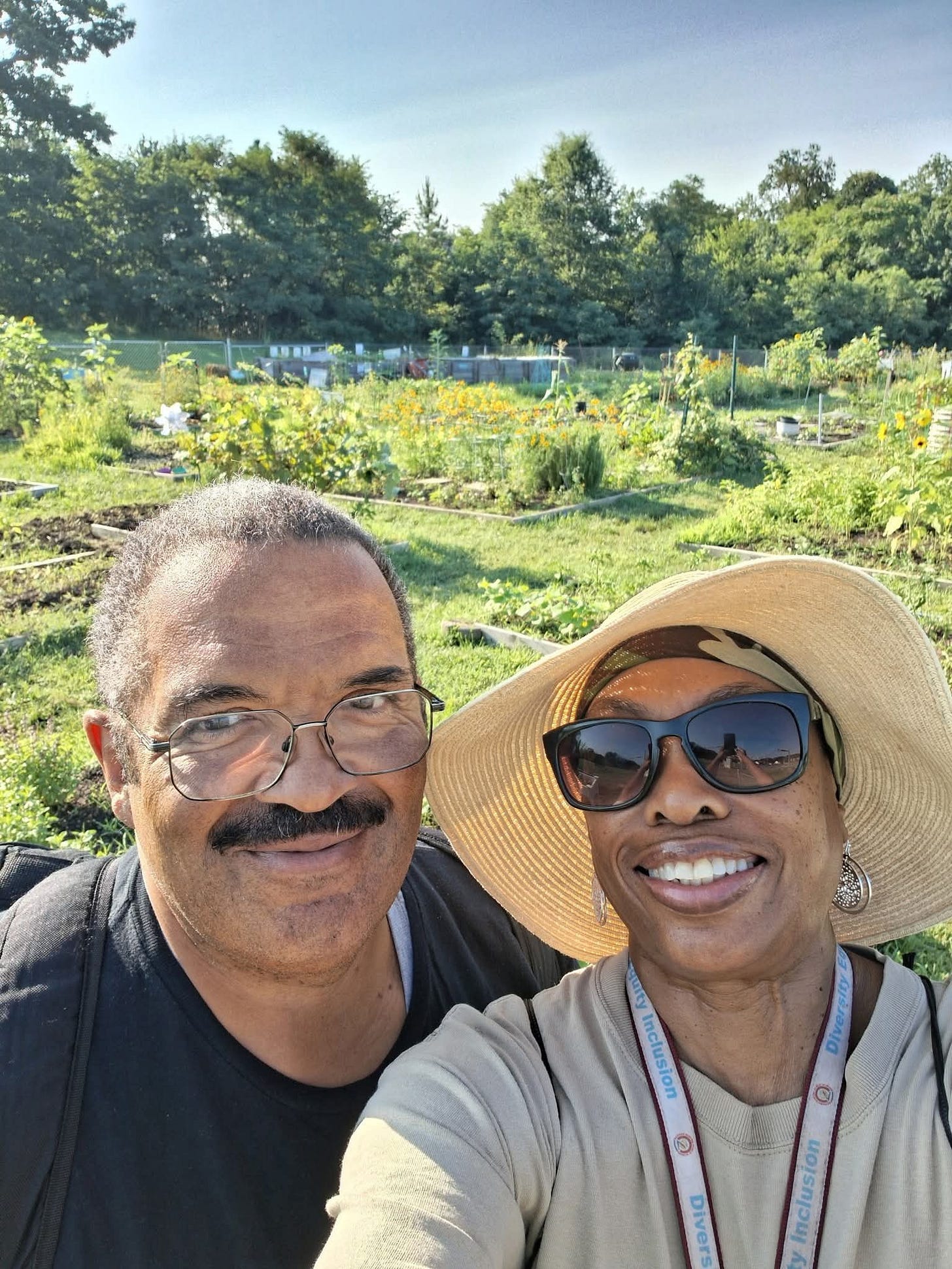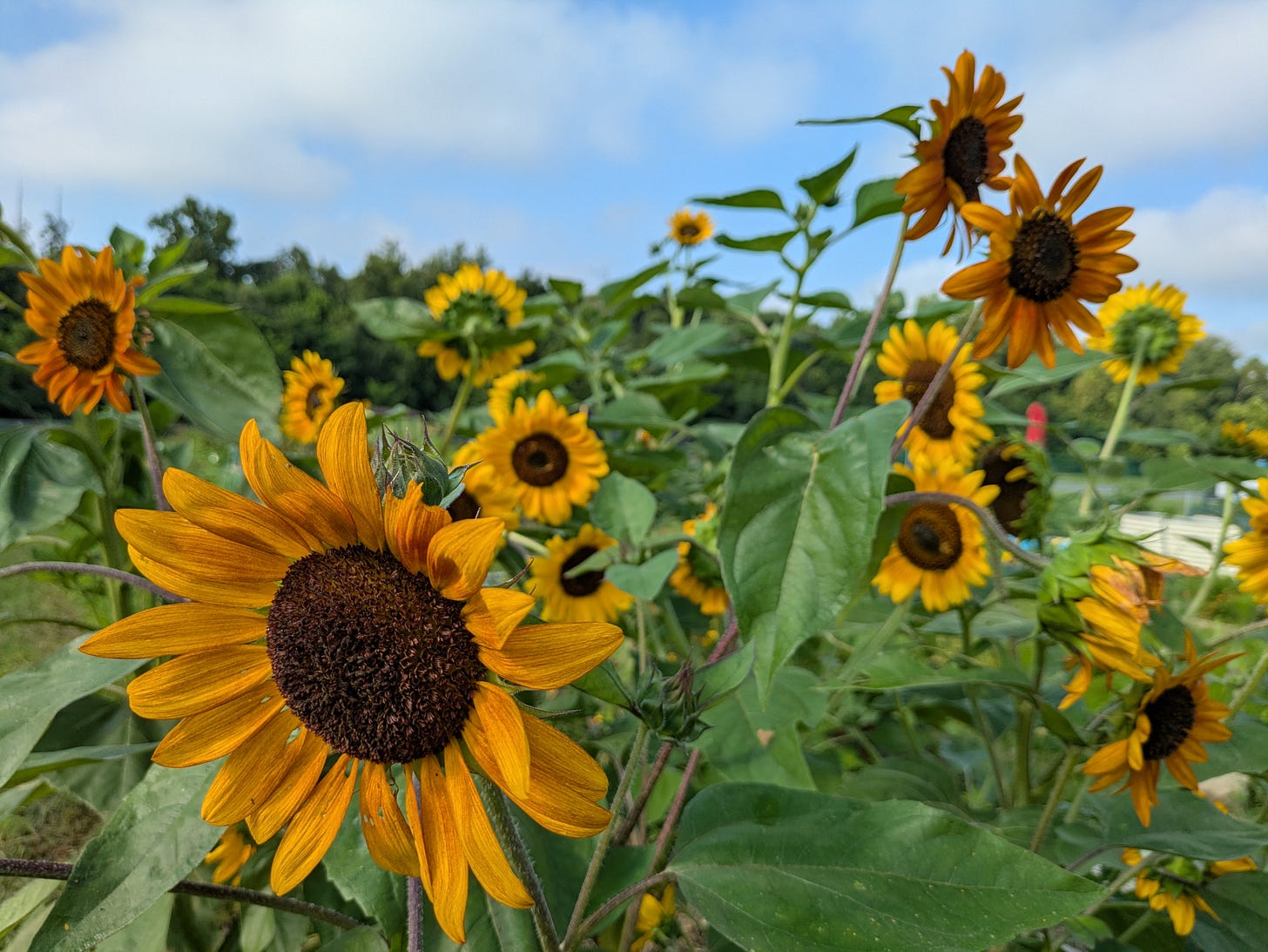Ways of Looking at a Garden
Columnist Eric Bonds recounts unexpected acts of generosity that he’s observed at Fredericksburg’s Bragg Hill Community Garden. Sometimes, in order to see them, you have to look past the weeds.
By Eric Bonds
COLUMNIST
The Bragg Hill Community Garden operates on city-owned land as a service to residents of Fredericksburg, who can sign-up free of charge for a garden plot to grow their own food and flowers. Located next to Snowden Park ballfield at the top of Fall Hill Ave, the garden is not a refined or elegant place. If you visit the garden, you’re certain to see some weeds gone wild and some unruly spaces.
Sometimes when I step into the garden, where I serve as a volunteer garden co-manager, all I can see is the weeds that need pulling, the grass that needs mowing, and the places that need to be spruced up. But in these moments, I miss noticing all the beauty and benefits this place has to offer.
For community gardener and Walker-Grant English teacher Warren Johnson, it’s about sinking roots into the soil. He relates that when he and his wife moved here, they “got an apartment and grew plants on the balcony. That was nice, but when we grew plants straight from the ground at the community garden, Fredericksburg began to feel like home.”
While Mike Bhagat knows more about gardening than almost anyone, he tells me that he uses the garden to educate himself “about plants and nature, to socialize, and to get peace and happiness.” The thing he most enjoys about the garden is its location, close to a busy neighborhood bustling with life.
One of the things I love most about the garden is that, I’ve come to see, it’s become a receptacle for unexpected gifts. Nature of course provides plenty of unanticipated blessings, like volunteer sunflowers emerging from the compost pile, a late-season visit from a migrating monarch butterfly, or the okra plants that just won’t stop producing.
Often, I’m floored by the tremendous generosity of people, like the anonymous neighbor who started tomato seedlings to share with the community, or the financial gift from a Fredericksburg-area family that helped us build some taller, more accessible garden beds.
And I love the story of garden member Michael Kearny, who found a bunch of unsold dying plants that had been thrown away behind a big box store. He took them home and nurtured them back to health. After they were revived, he brought them to the garden to give to others. Not incidentally, Mike also gives away all the veggies he grows from his plot to Fredericksburg neighbors in need.
Then there’s UMW student Katie Burbridge, who volunteered hours of her time almost every week last spring to help get the garden ready for the growing season.
I wasn’t smart enough to realize that if we had kid-sized tools, toys, and a wading pool, that the garden would become a place of play. Volunteer garden co-manager Sarah Dewees made this realization early on. Now children enjoy the garden as much or more than their parents.
And I didn’t ever think that one water hose could spring so many leaks. But Mike Cotter keeps patching it up again and again, and it’s still in commission. Mike is at the garden as much as anyone, growing an entire plot full of nothing but dahlias, which he uses to create gorgeous bouquets that he shares with others.
The Bragg Hill Garden has been shaped by hundreds of acts of generosity, too numerous for me to mention. But this doesn’t mean the garden is a utopia.
For one, we have a drainage problem after heavy rains. And like everything else having to do with human beings, we’ve had challenges and a little drama. And then there are those weeds. If we don’t keep after them, they will absolutely overtake the place.
Maybe there’s a trick to looking at a garden that can see both the flowers and the weeds, a way of looking that doesn’t let the ugly eclipse the very real beauty that exists, but that also doesn’t ignore the work we need to do.
Outside the garden, it’s all too easy to focus on what’s falling apart, what’s being taken away, and the people being left behind and hurt. That’s real. But it’s also not the full story.
Maybe, too, there’s a trick to looking at the world, one that is open to all its goodness and unexpected gifts, while at the same time acknowledging the mess that we are in, a mess that will only get worse until enough of us roll up our sleeves and work—in both politics and in the daily life of our community—to make it better.
Everyday, I’m trying to practice that trick.
Support the Advance with an Annual Subscription or Make a One-time Donation
The Advance has developed a reputation for fearless journalism. Our team delivers well-researched local stories, detailed analysis of the events that are shaping our region, and a forum for robust, informed discussion about current issues.
We need your help to do this work, and there are two ways you can support this work.
Sign up for annual, renewable subscription.
Make a one-time donation of any amount.
Local Obituaries
To view local obituaries or to send a note to family and loved ones, please visit the link that follows.
This article is published under Creative Commons license CC BY-NC-ND. It can be distributed for noncommercial purposes and must include the following: “Published with permission by FXBG Advance.”















Thank you